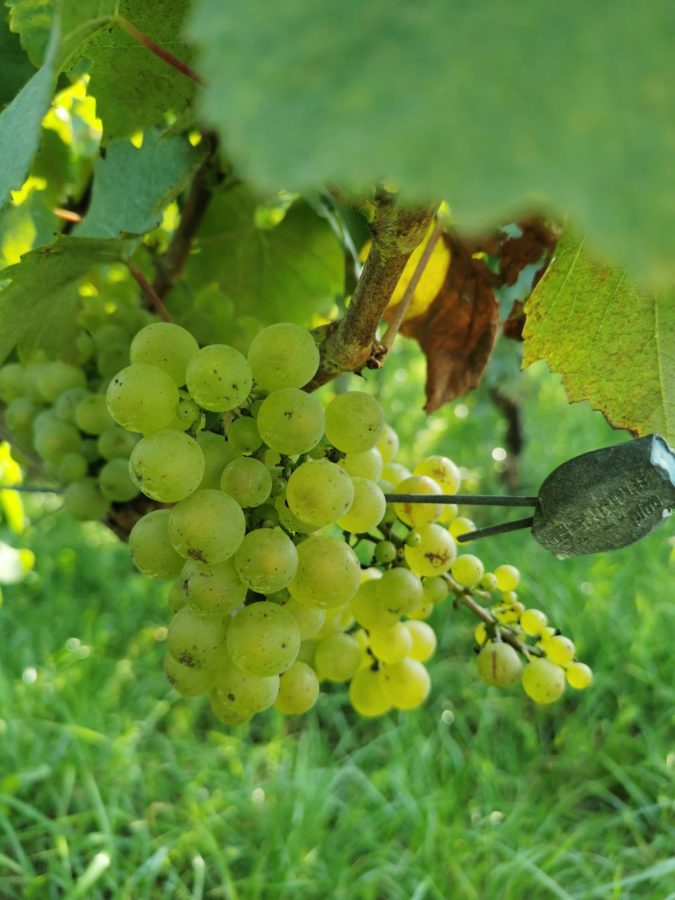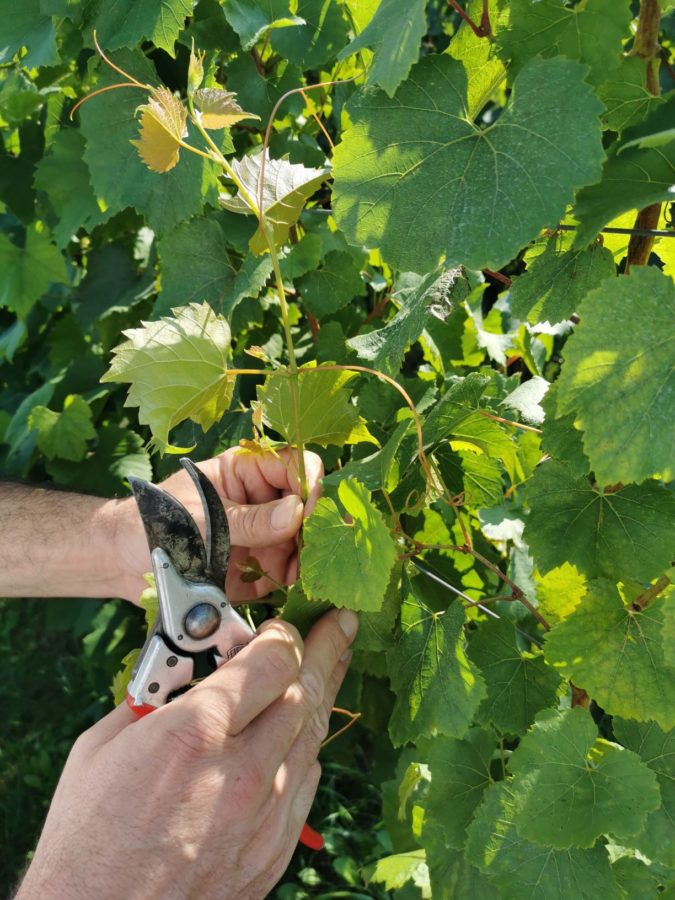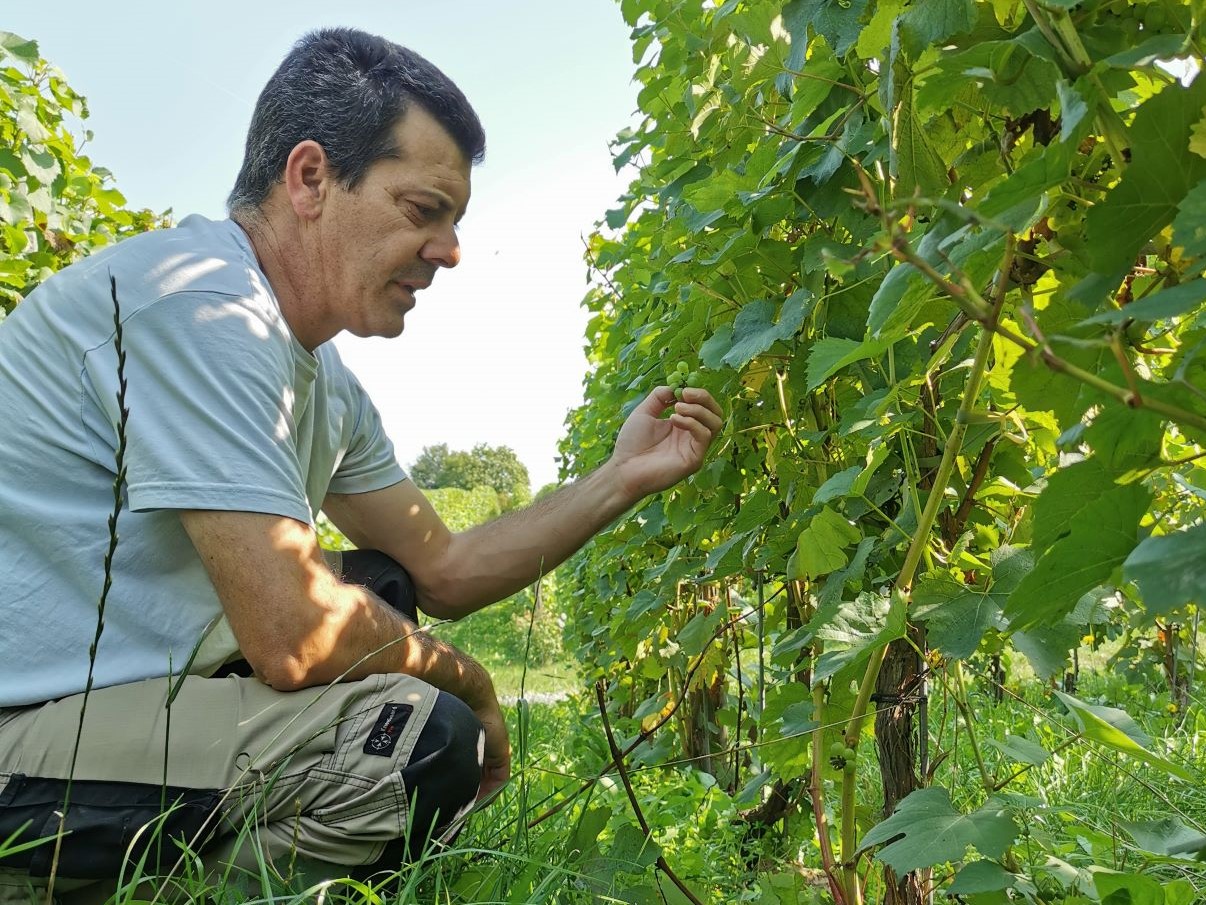Interview with Germano Prior, Head of Cultivation at the Château de Bousval vineyard.
Every day, he puts his passion and energy into the cultivation of the Château de Bousval vineyard. Tasting our wine also means discovering who is behind it and who shapes it throughout the year. Meet the pillar of our team: Germano Prior.
 Germano, you are the Head of Culture here at the Château Bousval vineyard. What is your role ?
Germano, you are the Head of Culture here at the Château Bousval vineyard. What is your role ?
I’m responsible for the whole of the vineyard’s cultivation. Most of my work takes place between February and October, from the first pruning to the end of the harvest. As Vineyard Manager, my objective is to produce quality grapes to make an exceptional wine.
Where does this delicious accent come from ?
I am of Portuguese origin, from the Douro region, where they make very good wine! I arrived in Belgium 25 years ago. I am 45 years old and have 3 children, aged 10, 17 and 23. I started early… (laughs)
How long have you been working here at Château de Bousval ?
I started working at the Château in 2005. Before I was in charge of the vineyard, I was in charge of the park, the woods and the whole property. One day, Mr Verhaeghe came to see me,
Mr Verhaeghe came to see me and offered to plant “a few small vines”. I immediately said yes. I am a winegrower by training, so for me it was an obvious choice. And “37,500 little vines” arrived all at once… There was no time to get bored! (laughs)
When the vineyard was born, I had to delegate a large part of my tasks. Today, cultivation takes up 80% of my time. Apart from that, I manage the different teams on the estate, those in the woods, the park and the vineyard.
Are you also in charge of training the teams ?
Yes, I’m responsible for training newcomers, whether they are permanent or seasonal.
We mainly use periodic helpers, who respond to the rhythm of the vineyard and the seasons. This means that we often have to repeat our explanations, because the seasonal workers change from year to year. It requires a lot of patience, time and energy, but it’s a passion that I like to pass on.
In my work, experience and precision are very important. Whether it’s pruning or disbudding, you can’t afford to make mistakes. It takes years of experience to understand and feel what a vine can offer us.
From the Douro Valley to Wallonia… have you always cultivated this passion for the land and the vine ?
In my family in Portugal, the vine is passed down from generation to generation. We have 3 hectares of vines. My father taught me everything. I completed this with a three-year theoretical training course.
I started working seriously in the vineyard at the age of 14. At that time, there was no technology like today… My father, my sister and I used to spray. My little brother Filipe, who is also a winegrower here in Bousval, would bring us the product to spray. We did this from 6 in the morning until 9 in the evening, without stopping. That’s where I learned the importance of consistency and precise work.
What is a day in the vineyard like ?
There’s not really a “typical” day and it’s rare to spend a full day in the vineyard.
I’m almost always asked to do something else at one time or another. Whether it’s for the park, the wood, someone to train, a delivery to welcome… I’m all over the estate.
Sometimes the days are long, especially during the spring frosts… I have sometimes worked 20 hours without sleeping. And when the vineyard is not doing well, I am unable to sleep.

What work and methods of viticulture do you prefer to obtain quality grapes ?
It’s a combination. There is no one thing or another to favour. Each stage of the vine cycle is crucial. If you prune badly, you pay for it later. If you disbud too roughly, the result will not be satisfactory. It is the whole process and the careful monitoring of each stage of the cycle that counts. You have to be able to anticipate and intervene at the right moments.
The most important thing is a deep love and respect for nature and what it offers us. This is our philosophy here at Château de Bousval.
Speaking of love for nature, you should be awarded the BIO label in January 2021.
What does this mean to you and the team ?
Our objective has always been to produce organic wines and, beyond the vineyard, everything we do at the Château has always been done with respect for nature. It would never occur to us to work any other way. But the label is clearly a plus. It is a guarantee for the consumer. We are proud to have it on our bottles, even if our wine has always been organic and in fact it doesn’t change anything.
What about biodynamics ?
We are very keen on it! That’s why we’re working on it. We are not yet at the stage of making 100% biodynamic wines, but it is our will. I did a first initiation in 2017 and since then, I continue to train and apply as much of my knowledge as possible to the cultivation of our vineyard.
Biodynamics is a complement to organic. It is based on the principle that “everything is in nature”. We use plants and their benefits to care for the vine, to relieve it, to hydrate it, etc. Each plant has its virtues. Each plant has its virtues. For example, we use wicker a lot, which has the power to soothe.
Biodynamics is above all a state of mind. You have to be calm, take things as they come and respect the rhythm of nature.
I’m planning to do a master’s degree in biodynamics in November. I have high expectations of this course. I think it will help us to make good progress.
What do you do the rest of the year, when it’s not pruning or harvest time ?
In November, after the harvest, I put everything in order for the winter. At the same time, I help with the vinification, bottling and labelling.
In January, we prepare for the new season and we pre-prune the vines. I also start distilling the previous year’s Marc, which has finished its fermentation. In February, the pruning team arrives and off we go again !
The harvest begins in a few days… Every year, the Château de Bousval invites the public to participate in this work,
What would you like to say to those interested to convince them to join you?
Harvesting is a lot of work, but it is also (and above all) a party!
The atmosphere is very friendly. It’s an opportunity to meet people from different worlds. We talk a lot. For us, it’s very important to look after our volunteers and to welcome them with dignity. The setting is magnificent. It’s a unique experience, in communion with nature. We move forward without stressing ourselves and we leave room for moments of relaxation. Wine is served. And a little water too… (laughs)

